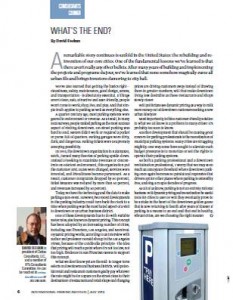A remarkable story continues to unfold in the United States: the rebuilding and reinvention of our core cities. One of the fundamental lessons we’ve learned is that there aren’t really any silver bullets. After many years of building and implementing the projects and programs du jour, we’ve learned that none somehow magically cures all urban ills and brings investors clamoring to city hall.
We’ve also learned that getting the basics right—cleanliness, safety, maintenance, good design, access, and transportation—is absolutely essential. If things aren’t clean, safe, attractive and user-friendly, people won’t come to work, shop, live, and play. And that simple truth applies to parking as well as everything else.
A quarter century ago, most parking systems were geared to enforcement or revenue.
As a result, in many local surveys, people ranked parking as the most noxious aspect of visiting downtown. On-street parking was hard to find. Meters didn’t work or required a pocket or purse full of quarters. Parking garages were dirty, dark, and dangerous. Parking tickets were a supremely annoying possibility.
In 1990, the downtown organization in Kalamazoo, Mich., turned many theories of parking upside-down. Instead of seeking to maximize revenues or concentrate on efficient enforcement, this organization put the customer first. Rules were changed, services were invented, and friendliness became paramount. As a result, customer complaints dropped by 80 percent, ticket issuance was reduced by more than 60 percent, and revenues increased by 50 percent.
Today, we have the technology and the data to make parking a non-event. However, two recent developments in the parking industry could turn back the clock to a time when parking was the most hated aspect of a visit to downtown or an urban business district.
One of these developments has to do with variable meter rates, also known as dynamic pricing. This concept has been adopted by an increasing number of cities, including San Francisco, Los Angeles, and Montreal. Dynamic pricing works, according to an interview with author and professor Donald Shoup in the Los Angeles Times, because of the Goldilocks principle—the idea that pricing will reach a point where it’s not too low, not too high. Evidence in San Francisco seems to support this concept.
What we don’t know yet are the mid- to longer-term effects on downtowns and business districts. Will potential retail and restaurant customers gladly pay whatever the rate might be for a space on the street close to their destination? If restaurants and retail shops find changing prices are driving customers away instead of drawing them in greater numbers, will that make downtown living less desirable as these restaurants and shops slowly close?
Will politicians see dynamic pricing as a way to milk more money out of downtown customers seeking a new urban lifestyle?
Most importantly, is this a customer-friendly solution to what we all know is a problem in many cities? It’s probably too soon to know.
Another development that should be causing great concern for parking professionals is the monetization of municipal parking systems. Many cities are struggling mightily. One way some have sought to alleviate such budget pressures is to monetize or sell the rights to operate their parking systems.
As both a parking professional and a downtown revitalization professional, I worry that we may soon reach an annoyance threshold where downtown parking once again becomes so painful and expensive that drivers opt for other places where parking is ostensibly free, undoing a couple decades of progress.
As all of us know, parking is not an entirely rational business. Will dynamic pricing and monetization be useful tools for cities to use? Or will they eventually prove to be a stake in the heart of the downtown golden goose that is now returning to health after years of illness? If parking is a means to an end and that end is healthy, vibrant cities, are we choosing the right means?
David Feehan is president of Civitas Consultants, LLC., and a member of IPI’s Consultants Committee. He can be reached at civitas.dave@me.com or 202.288.0528.

